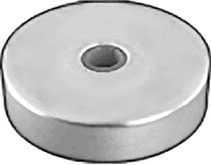









 They have played a key role in the protection of residential and commercial water heater tanks, boat propellers, and water storage tanks, just to name a few.
They have played a key role in the protection of residential and commercial water heater tanks, boat propellers, and water storage tanks, just to name a few.
Metal loss (or metal corrosion) occurs by means of Electrolysis. Electrolysis occurs when two dissimilar metals are physically connected in water; one will corrode away to protect the other. Although relatively unknown to most, the principle is extremely common place.
When two metals are placed together in water, the "more noble" (or less reactive) one will remain intact while the more reactive (less noble) one will corrode. When steel and copper are together, steel is the ‘less noble’ metal that will corrode. Magnesium, zinc, and aluminum metals are all less noble than steel or copper, and this is why they are the most common metals used as sacrificial anodes.
 Sacrificial anodes come in all shapes and sizes (depending on the application). A common shape is a rod (or bar) made of magnesium, zinc or aluminum that's formed around a steel core wire and is grounded to the piece of equipment being protected.
Sacrificial anodes come in all shapes and sizes (depending on the application). A common shape is a rod (or bar) made of magnesium, zinc or aluminum that's formed around a steel core wire and is grounded to the piece of equipment being protected.
When the sacrificial anode comes into contact with equipment metal (and the water within the equipment), an electrolytic process begins whereby the sacrificial anodes are consumed to protect the equipment metals. Another form of anode “Powered anodes” work similarly, however the sacrificial process is replaced with electricity and the anodes are not consumed.
Metal loss (also know as metal corrosion) occurs by means of Electrolysis. Electrolysis simply means that when two dissimilar metals are physically connected in water, one will corrode away to protect the other. Although few people have heard of this, the principle is extremely common place. All metals fall somewhere on the galvanic scale of reactivity. When two metals are placed together in water, the "more noble" (or less reactive) one will remain intact while the more reactive (less noble) one corrodes. When steel and copper are together, steel will be the ‘less noble’ one that corrodes. Magnesium, zinc, and aluminum metals are less noble than steel or copper, which is why they are most common metals used for sacrificial anode rods.
A sacrificial anode's life depends on the quality of water, the types of dissimilar metals involved, the water temperature, and the size and quantity of the anodes used. Excessively high water minerals (high conductivity) can lead anodes to corrode more quickly.